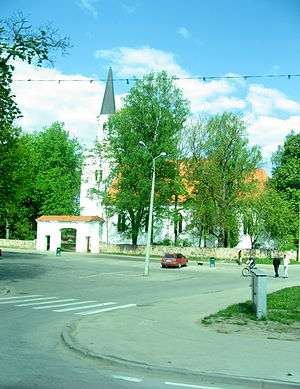Iecava
Iecava (German: Eckau) is a town on the via Baltica in Iecava municipality, in the Zemgale region of southern Latvia. The town has a population of around 5500 people. Iecava lies 40 km south of Riga and 23 km north of Bauska and was mentioned in historical documents as early as 1492. Till 23 june 2020 Iecava was a village.
Iecava German: Eckau | |
|---|---|
village | |
 Lutheran church in Iecava. | |
 Iecava Location in Latvia | |
| Coordinates: 56°36′N 24°12′E | |
| Country | |
| Municipality | Iecava Municipality |
| Population | |
| • Total | 5,500 |
| Time zone | UTC+2 (EET) |
| • Summer (DST) | UTC+3 (EEST) |
| Postal code | LV-2164 |
| Website | Iecava official site |
History
The city was founded by Johann Freytag von Loringhoven in 1492. Although the village's Latvian name has always been Iecava, internationally it was known by its German name Gross Eckau until the beginning of the 20th century. It was the scene of a victory over Russian forces by Prussian troops fighting for Napoleon during his invasion of the Russian Empire [1] and was also the scene of fighting during the Second World War German retreat from the Soviet Union.
South of the city centre lies a park around the former manor of Count Peter Ludwig von der Pahlen, of which only the foundation walls and some yard buildings remain.[2] The French General Marshal MacDonald, who commanded the Prussian troops who were fighting as part of the Grand Armée, occupied the Gross-Eckau castle after battle of Ekau during the Napoleonic War with Russia.[3]
The church of Iecava dates from the 17th Century but was damaged in various wars and incidents from the Battle at Gross-Eckau 7 July 1812[3] to the Second World War and a 1972 fire.
In addition to farming, the town supports manufacturing enterprises including vegetable oil and white spirits.
Notable people
Prominent Latvians born in Iecava include Friedrich Wilhelm Matisohn (1871-1913) and Arvīds Pelše (1899-1983).
See also
References
- (in German) Eckau de:Johann Samuel Ersch de:Allgemeine Encyclopädie der Wissenschaften und Künste
- Iecavas muiza. Groß Eckau. By I. Lancmanis. Edited by the Rundale Palace Museum, 2001, 72 p., 75 ill. A monographic study devoted to the history of the estate, architecture, works of art and the family of the counts von der Pahlen. Text in Latvian and German with a summary in English and Russian.
- Conrad, Mark, ed. (1912). "Regarding the Battle at Gross-Eckau, 7 July 1812". Russkaya Starina Vol. 151. pp. 95–96. Archived from the original on 24 May 2006.